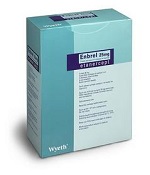Amgen has already paid $762 million to wrap up off-label marketing claims with the feds. Now, 48 states have won another promise to pay from the California-based drugmaker. This time, it's $71 million to resolve allegations that it broke the rules when marketing its anemia drug Aranesp and anti-inflammatory blockbuster Enbrel, two of its best-selling meds.
 Announced by several attorneys general late Tuesday, the settlement is the latest state-level crackdown on alleged marketing violations in the pharma industry. In addition to the cash settlement, the company promised not to make misleading or deceptive claims in promoting the two meds and to stop lobbying for treatment guidelines that sanction off-label use.
Announced by several attorneys general late Tuesday, the settlement is the latest state-level crackdown on alleged marketing violations in the pharma industry. In addition to the cash settlement, the company promised not to make misleading or deceptive claims in promoting the two meds and to stop lobbying for treatment guidelines that sanction off-label use.
On the Aranesp side, the states claimed that Amgen ($AMGN) promoted the drug for cancer-related anemia when it was specifically approved for another type. To win insurance coverage, the company lobbied for Aranesp to be included in a drug compendium used by The Centers for Medicare and Medicaid Services--and then failed to disclose trial data showing an increased risk of death and potential acceleration of tumor growth in cancer patients using Aranesp.
As for Enbrel, Amgen is accused of touting the drug for patients with mild psoriasis, despite the fact that it was only approved in moderate-to-severe cases. The state AGs said Amgen overstated its effectiveness in those patients, without "reliable evidence" to support its use as a treatment for mild psoriasis. The company promoted Enbrel off-label from 2004 to 2011, the states claim.
In multiple individual statements, the attorneys general slammed pharma for abusing consumers' trust, particularly because misleading statements can trigger potentially serious side effects.
 |
| Connecticut AG George Jepsen |
"Deceptive marketing in the pharmaceutical industry is particularly concerning because, in addition to violating our unfair trade practice laws, it could have potentially significant and dangerous consequences on the health and well-being of those taking the drug," Connecticut AG George Jepsen said in a statement.
Tennessee's AG, Herbert Slatery III said: "Consumers need to be able to trust that what they are being told accurately describes the product they are buying. This is a health and safety issue and drug manufacturers should be held accountable for misleading and deceptive practices." Arizona AG Mark Brnovich was more blunt: "Deceptive marketing practices will not be tolerated," he said.
Enbrel brought in $4.7 billion last year, while Aranesp delivered $1.9 billion. Amgen said Tuesday that it was "pleased" to wrap up the settlement and emphasized that it did not admit wrongdoing as part of the deal.
In 2012, in a marketing settlement with the Justice Department, Amgen agreed to pay a criminal penalty of $150 million and another $612 million to wrap up civil claims. At the time, it was a record False Claims Act settlement with a biotech company. Federal prosecutors said Amgen had touted Enbrel for off-label uses to grab market share and increase sales of the drug. Like the state AGs, the feds also claimed that Amgen promoted Aranesp for cancer patients despite its lack of FDA approval.
- see the Connecticut AG's release
- get more from Tennessee's attorney general
- and more from Arizona's AG
Special Reports: Pharma's Top 11 Marketing Settlements | Top 15 pharma companies by 2014 revenue - Amgen